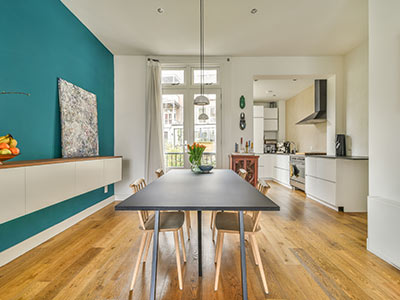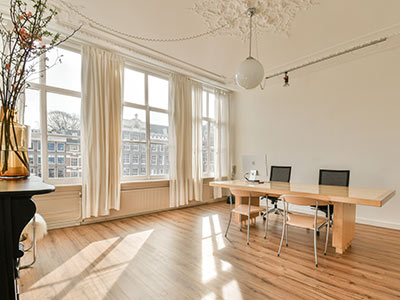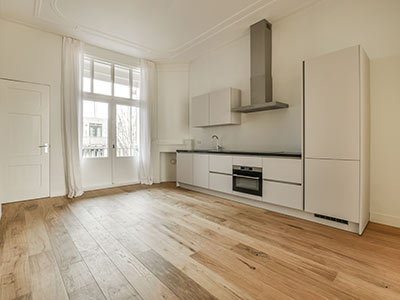Back to Flooring Products
Difference Between Softwood and Hardwood Flooring
 Choosing the ideal flooring material is a decision of paramount importance, with the softwood versus hardwood debate often taking centre stage. This blog post is dedicated to deciphering the nuanced differences between these options, providing you with the insights needed to confidently determine the perfect fit for your upcoming flooring project.
Choosing the ideal flooring material is a decision of paramount importance, with the softwood versus hardwood debate often taking centre stage. This blog post is dedicated to deciphering the nuanced differences between these options, providing you with the insights needed to confidently determine the perfect fit for your upcoming flooring project.
Material Composition
Softwood flooring is derived from coniferous trees such as pine, spruce, and cedar. Unlike hardwood, softwood flooring is less dense and lighter in weight. This makes it easier to install and move around if necessary. One of the characteristics of softwood flooring is its straight-grain pattern. This means that the wood fibres run parallel to each other, creating a consistent and uniform appearance. This straight-grain pattern gives softwood flooring a clean and sleek look, making it an attractive option for many homeowners. In addition to its aesthetic appeal, softwood flooring is also known for its affordability, making it a popular choice for those on a budget. However, it's important to note that softwood flooring may be more prone to scratches and dents compared to hardwood flooring due to its lower density. When properly cared for and maintained, softwood flooring can provide a beautiful and durable flooring option for any home.
Sourced from deciduous trees such as oak, maple, and cherry, hardwood flooring is known for its dense and heavy nature. This makes it highly durable and resistant to wear and tear. One of the key features of hardwood flooring is its wide range of grain patterns, which adds to its overall aesthetic appeal. From sleek and uniform to rustic and natural, the grain patterns in hardwood flooring can complement any style or interior design. Additionally, hardwood flooring can be stained in various colours, giving homeowners the flexibility to match it with their existing décor. Whether it's a modern living room or a traditional kitchen, hardwood flooring offers a timeless and versatile flooring option that can enhance the overall look and feel of any space.
Durability and Lifespan
Softwood flooring is generally considered to be less durable than its hardwood counterparts. While softer woods like pine, spruce, and fir offer a cost-effective alternative to hardwood flooring, they are more prone to dents, scratches, and wear over time. This is due to their lower density and less robust composition. As a result, softwood flooring may not be the best choice for high-traffic areas in commercial settings or busy households with pets or young children. However, softwood flooring can still be a suitable option for areas with lower foot traffic, such as bedrooms or guest rooms. With proper care and maintenance, softwood flooring can last for many years. Regular cleaning, protecting the surface from heavy furniture, and applying protective coatings can help extend the lifespan of softwood flooring. Ultimately, the durability and lifespan of softwood flooring will depend on the quality of the wood, its installation, and the level of foot traffic it endures.
Hardwood flooring is a popular choice among homeowners due to its ability to withstand the test of time. One of the reasons hardwood flooring is so durable is because it is made from natural hardwood, which is inherently strong and resistant to damage. Additionally, hardwood flooring is resistant to daily wear and tear, making it suitable for high-traffic areas in the home. Whether it's in the kitchen or living room, hardwood flooring can handle the constant foot traffic without showing signs of wear and tear. With proper maintenance and care, hardwood flooring can last for decades. This includes regularly cleaning and protecting the flooring from spills and scratches. Additionally, periodic refinishing can help restore the appearance and extend the lifespan of the flooring. Therefore, for homeowners seeking a flooring option that is not only aesthetically pleasing but also long-lasting, hardwood flooring is an excellent choice. Its durability and ability to withstand daily use make it a worthwhile investment that can enhance the beauty and value of any home for years to come.
Appearance and Aesthetics

For those seeking a rustic and cosy aesthetic in their homes, softwood flooring is a very popular choice. With light colour tones and a charming, old-world appeal, softwood flooring adds warmth and character to any living space. However, it is important to note that softwood flooring comes with limited variety in terms of colour and grain patterns. This might be a drawback for those seeking a more diverse and unique flooring option. Nevertheless, the simplicity and homely feel of softwood flooring makes it well-suited for creating a cottage-like ambience. Whether paired with vintage furniture or contemporary décor, this type of flooring brings a touch of nature and simplicity to the room, creating an inviting and serene atmosphere. Its light colour tones also help to brighten up the space, making it feel larger and more open. So, if you are looking to create a cosy and charming living space, softwood flooring might just be the perfect choice for you.
One of the main advantages of hardwood flooring is the wide range of colours it offers. From light shades like oak or maple to darker options like mahogany or walnut, hardwood flooring can accommodate various design choices. Additionally, the distinctive and intricate grain patterns found in the hardwood add a touch of elegance to any space. These patterns create a sense of texture and depth, enhancing the overall aesthetics of the room. Another advantage of hardwood flooring is its versatility in complementing different interior designs. Whether you have a traditional or modern style, hardwood flooring can seamlessly blend in and elevate the overall look of your space. It's natural warmth and timeless appeal make it a perfect choice for anyone looking to create a cohesive and visually pleasing environment in their home. Overall, the wide range of colours, distinctive grain patterns, and ability to enhance both traditional and modern interior designs make hardwood flooring a popular and aesthetically pleasing choice.
Maintenance and Refinishing
Softwood flooring, although beautiful and warm, requires more frequent maintenance compared to other types of flooring to preserve its appearance. Due to its soft nature, softwood flooring is prone to scratches and dents, which may necessitate refinishing over time. Regular maintenance, such as sweeping and dusting, is essential to prevent dirt and debris from scratching the floor's surface. Additionally, applying protective felt pads to furniture legs and using rugs or mats in high-traffic areas can help reduce the risk of damage. When it comes to refinishing softwood flooring, it is recommended to seek professional help as they have the expertise and equipment to properly assess and repair any scratches or dents. They can also provide guidance on the best refinishing options available to restore the floor's appearance and extend its lifespan.
One of the advantages of hardwood flooring is its relatively low maintenance requirements. Unlike carpet or other types of flooring, hardwood floors typically only require routine cleaning to keep them looking their best. This can be done by regularly sweeping or vacuuming the floor to remove dirt and debris, and using a damp mop to remove any spills or stains. Additionally, hardwood flooring has the ability to be sanded and refinished multiple times, which can significantly extend its lifespan. Over time, hardwood floors may become scratched or dull, but by sanding down the surface and applying a fresh coat of finish, the floor can be restored to its original beauty. This refinishing process can be done every 5-10 years, depending on the amount of wear and tear the floor experiences. Overall, maintenance and refinishing are important aspects of owning hardwood flooring, but with proper care, it can remain a durable and beautiful addition to any home.
Cost Considerations

Compared to hardwood flooring, softwood flooring tends to be more budget-friendly upfront, making it an attractive option for those looking to save money. However, it is important to consider the long-term costs associated with softwood flooring. While the initial cost may be lower, softwood flooring typically requires more maintenance to keep it looking its best. This can include regular sealing and refinishing to protect the wood from damage and wear. Additionally, softwood flooring may not be as durable as hardwood flooring, meaning it may need to be replaced more frequently, further adding to the overall costs. Therefore, while softwood flooring may offer cost savings in the beginning, it is important to weigh these savings against the potentially higher maintenance and replacement costs in the long run.
When considering hardwood flooring, you must take into account the cost considerations associated with this type of flooring. Hardwood flooring typically comes with a higher initial investment due to its quality and durability. This means that the upfront cost of purchasing and installing hardwood flooring may be higher compared to other flooring options. However, it is important to note that hardwood flooring offers long-term savings. This is because hardwood flooring has a longer lifespan compared to other flooring materials, such as carpet or laminate. Additionally, hardwood flooring requires lower maintenance needs, reducing the costs associated with regular cleaning and repairs. As a result, while the initial investment for hardwood flooring may be higher, it's longevity and lower maintenance needs can result in significant long-term savings. Therefore, budget-conscious homeowners may find that investing in hardwood flooring is a wise financial decision.